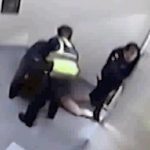Police Officers Face Court for Lying About Assault at Police Station

Six NSW police officers are facing charges of attempting to pervert the course of justice after an assault on Aboriginal man Cory Barker at Ballina police station in January 2011.
The Incident and Local Court Hearing
As previously reported, 23-year old Barker was arrested and transported to the station after allegedly throwing an empty plastic bottle at police during a late night confrontation.
Police alleged that, while at the station, Barker threw a punch at police before he was set upon by at least four officers.
Barker was charged with assaulting police, and the matter ultimately proceeded to a defended hearing before Magistrate Heilpern in Ballina Local Court.
In the lead-up to the hearing, police claimed to have lost the CCTV footage of the incident but – as fate would have it – the recording turned up just before the scheduled court date.
Magistrate Heilpern dismissed the charges against Mr Barker after viewing the footage, finding no evidence that he assaulted police. His Honour was scathing in his criticism of the heavy-handed actions of the police officers involved.
The footage shows four officers slamming Barker into a bin and then a chair, before swinging him into a machine and then repeatedly kicking and punching him whilst he is on the ground, then dragging him out of the room and leaving him handcuffed on the floor for over an hour.
Police Integrity Commission
Magistrate Heilpern referred the case to the Police Integrity Commission (PIC), which launched a misconduct investigation against Senior Constables David Ryan Hill, 36, and Mark Woolven, 45, Constables Ryan Eckersley, 36, and Luke Mewing, 30, Probationary Constable Lee Walmsley, 26, and Sergeant Robert McCubben, 49.
The investigation found that Officer Hill’s statement had been emailed to some of the other officers on 19 January 2011, and that all of the police statements were remarkably similar. The sworn statements all claimed that Barker had “punched… [Hill] with a closed right fist to the nose”. The PIC found the police version of events to be completely inconsistent with the CCTV footage.
The PIC concluded that the officers had colluded and fabricated their sworn statements, which led to a total of 25 charges being brought against the four assaulting officers and two on-duty colleagues, including attempting to pervert the course of justice, perjury and common assault.
District Court Trial of Police Officers
The officers appeared in Downing Centre District Court to face trial on Monday 14th November 2016.
During his opening submissions, Crown Prosecutor Craig Patrick SC told the jury they would be given the opportunity to view the CCTV footage and would receive evidence establishing beyond any reasonable doubt that the officers colluded in a cover-up over the incident.
Barristers for the police officers contended that – despite the footage – there is a reasonable possibility their clients had made a mistake rather than deliberately set out to pervert the course of justice.
Officer Woolven’s barrister, David Carroll, submitted that after viewing the footage, his client realised he was mistaken, claiming his client “… did his best in his statement… He didn’t lie deliberately.”
The trial continues.
Police Powers
Section 99 of the Law Enforcement (Powers and Responsibilities) Act 2002 (the LEPRA) gives police the power to arrest a person if he or she suspects on reasonable grounds that the person is committing, or has committed, an offence and the officer is satisfied that the arrest is reasonably necessary for any one of the following reasons:
- To ensure the appearance of the person before a court
- To prevent a continuation of the offence or the commission of another offence.
- To prevent interference with evidence.
- To prevent the fabrication of evidence.
- To preserve safety or welfare of any person; not just witnesses and including the defendant.
- To stop the person fleeing.
- To obtain property in possession of the person in connection with the offence.
- Because of the nature or seriousness of the offence.
Section 230 of the Act requires arresting police to exercise no more force than is “reasonably necessary to exercise the function”.
Section 231 explicitly states that the use of force must be that which “is reasonably necessary to make the arrest or to prevent the escape of the person after arrest”.
Anything beyond this can give rise to criminal charges for assault, and/or civil action for intentional torts such as assault/battery and false imprisonment.






